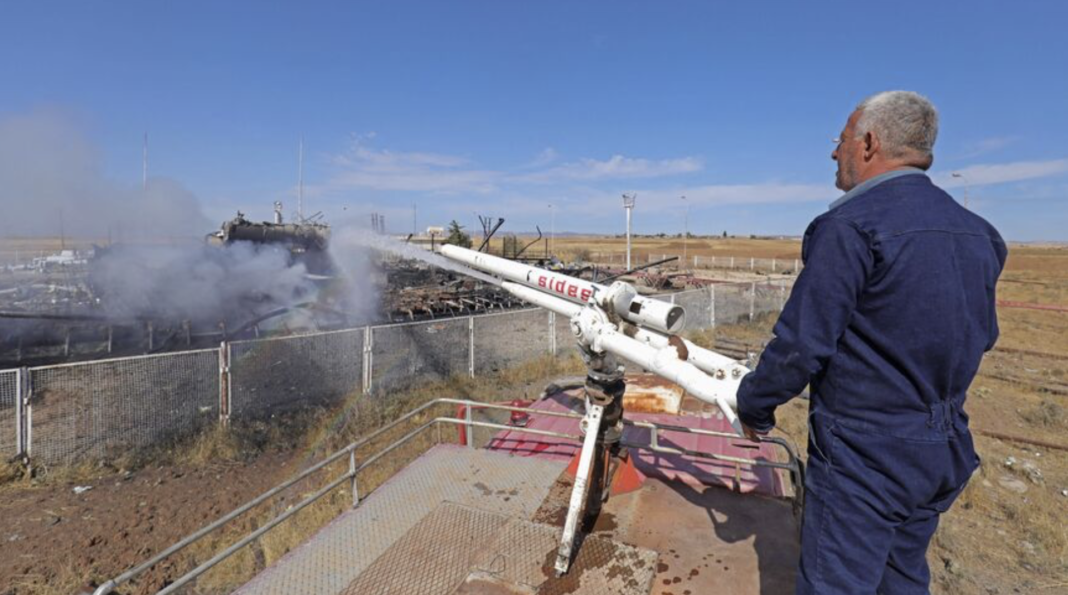The Turkish president also said the first phase of Turkey’s ongoing operations against outlawed Kurdish militants and dominant Syrian Kurdish groups was concluded.
October 10, 2023, Ezgi Akin, Al-Monitor.
urkey’s President Recep Tayyip Erdogan said on Monday that his country concluded the first phase of its operations in northern Syria and northern Iraq, while insisting that Ankara will not forget Washington’s downing of its drone during the operation last week.
“As in every operation, we experienced the biggest problem with our ally, » Erdogan said, referring to the US downing of the drone last Thursday in northern Syria. “There is no doubt that this incident has been noted in our national memory and the necessary action will be taken when the time comes,” Erdogan said without elaborating.
He added that his country couldn’t prevent the “unpleasant” incident, reiterating Ankara’s previous warning to third countries to stay clear of Turkey’s targets.
Turkey has been striking Kurdish militant bases in northern Iraq and US-allied Syrian Democratic Forces-held areas in northern Syria over the past week.
“The first phase of our operation, in which we targeted only members of the terrorist organization, facilities used by terrorists, sources of income and capabilities of terrorism, was completed successfully,” Erdogan said, adding that a total of 194 targets were destroyed as part of Turkey’s airstrikes and artillery fire.
He also vowed that the operations against the groups that it considers terrorists will continue in greater strength and force.
In a separate statement on Monday, the Turkish Defense Ministry put the total of targets struck in northern Syria by Turkish warplanes since the operation was launched on Oct. 5 at 51. These included bunkers, caves and oil facilities. The Kurdish-held zone is home to most of the country’s oil wealth, which is the source of income for the Autonomous Administration of North and East Syria.
While Ankara says it was only targeting terrorists and their sources of income, the SDF said in addition to the security posts belonging to its forces, numerous agricultural areas, electricity, clean water facilities and schools were among Turkey’s targets.
SDF commander Mazloum Kobane on Sunday accused Ankara of attempting to disrupt civilian life in the region. “During the past 72 hours, Turkey targeted more than 145 locations in our safe region, including power stations, water and energy facilities, hospitals, and schools,” Kobane wrote on social media on Sunday.
“This is an assault on international efforts and the work of civil society organizations and institutions that work to establish stability and serve the local population after the defeat of [the Islamic State],” he added.
Turkey’s offensive covered an area of more than 450 kilometers (280 miles) stretching from Derik near the Iraqi border in northeast Syria to Manbij, which lies to the west of the Euphrates River. Kobani — a small Kurdish-majority town that became a symbol of the Kurds’ struggle against the Islamic State and where the SDF’s alliance with the United States was first forged — as well as the northern Syrian towns of Ain Issa, Amouda and Qamishli were also targeted in the operation.
Turkey is seeking to set up a buffer zone 30 kilometers (18 miles) deep inside Syria along its 909-kilometer (565-mile) border to clear the area of the dominant Syrian Kurdish groups.
In addition to the regions along the Turkish border, Turkish forces also hit the eastern Syrian province of Deir Ezzor, which saw deadly protests by local Arab tribes against the SDF last month.
Turkey’s air offensive came in response to a suicide bombing attack at the entrance of the headquarters of Turkey’s national police in Ankara earlier this month that left the two assailants dead and two police officers wounded. It was the first attack claimed by the outlawed Kurdistan Workers Party (PKK) inside Ankara since 2016.
Turkey equates the SDF with the PKK and has long been pressing Washington to end its alliance with the militia group. More recently, it has been calling for the withdrawal of some 900 US troops deployed in northern Syria as part of the US-led international coalition in the fight against the Islamic State.
Last Wednesday, Turkey’s Foreign Minister Hakan Fidan said Ankara had established that the two militants who carried out the Ankara attack had traveled to Turkey from Syria and declared all facilities in the SDF-held areas “legitimate targets” for Turkey. The SDF has denied any links with the perpetrators.
He also warned third parties to stay clear of those targets in a thinly veiled reference to the US troops. The next day, US forces shot down an armed Turkish spy drone after it came as close as 500 meters (some 540 yards) from a US military base. Turkey blamed the incident on “a varying technical assessment” of deconfliction mechanisms between Ankara and Washington.
The PKK, which has been waging an armed campaign against Turkish forces since 1984 for Kurdish self-rule inside Turkey, is considered a terror group by Turkey, the United States and the European Union.

